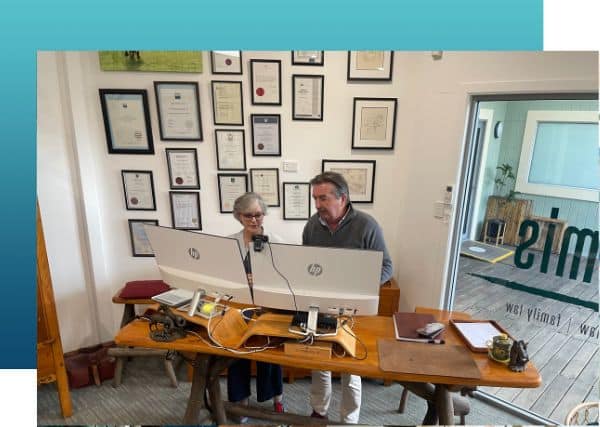In some cases, all reasonable efforts to agree parenting arrangements fail. Family Dispute Resolution (FDR) within the Federal Circuit and Family Court of Australia context provides a non-litigious opportunity for you and your former partner to come up with the best care arrangements for your child or children.
If you and your former partner are unable to agree your parenting arrangements and you find yourselves travelling along the court pathway, then, before your matter heads to Trial, you may agree to or be ordered to attend an FDR Conference. If it is safe to do so, the Court expects you to try to resolve your disagreements through compromise, discussion and through negotiation through your legal representatives.
What is a Family Dispute Resolution Conference?
An FDR Conference in the court framework is a process to assist you to resolve some or all your disagreements arising from your divorce or your separation about care arrangements for your child or children, with the assistance of a judicial registrar. The judicial registrar is independent and experienced in understanding parenting issues and the views the court will likely take regarding your circumstances. The judicial registrar who will preside over your matter has been authorised as an FDR Practitioner by the Court’s CEO.
Judicial registrars understand that parenting can be challenging and confronting. Judicial registrars know that parenting holds up a mirror to you and can potentially assist personal growth. The court does not expect you to be a ‘perfect’ parent. The court’s expectation is that you should have the curiosity to do better and to grow and to have an abiding concern for your children’s needs.
The FDR Conference empowers parents to come to agreements in a comfortable, safe, and respectful space and gives parents and opportunity to feel heard. It is likely that up until the FDR conference, your voice, as a parent may have not yet been heard in Court. This means that it is you may feel that you have not been heard. Usually, judicial registrars are open to you and your former partner speaking for yourselves. The FDR conference is a space for you to state your concerns, to discuss issues and to ensure that your views are clearly expressed.
Agreements made during FDR can be made into binding court orders, giving you certainty and structure and, most importantly, finalising parenting arrangements and avoiding the cost and stress of having your matter determined by a judge at Trial.
If you and your former partner can reach an outcome together, then the orders that result from your agreements have more strength going into the future. Research shows that when parents have reached their own solutions, then those orders are more likely to be upheld. When a judge makes the decisions about your care of your children, remember that the judge is a stranger. The FDR Conference is a forum for you and your former partner to achieve clarity and to experience the value of discussion with the final aim of reaching a resolution about the care of your child or children.
The court is not prejudiced about the structure of your family unit. The court’s focus is the concern for your child or children and how they function in your unique family unit. The FDR Conference aims to provids a positive atmosphere, for the good of your child or children and involves realistic discussions about the care arrangements for your child or children.
If you must attend court appointed FDR, you will engage in a two-part process. The first part is a web conference call with a judicial registrar designed to introduce you to the second part of the FDR conference, to which a full day is usually allocated.
What happens during Part 1 of FDR?
You will be allocated a forty-five-minute timeslot that you can attend via web conference. You will meet the judicial registrar who will preside over Part 2 of your FDR Conference. You will be given information about what to expect from the Part 2 of the FDR Conference, and what will be expected from you.
What happens during Part 2 of FDR?
The day before your full day FDR conference, you or your legal representative will receive a Microsoft Teams link. The day typically lasts from 9.30am – 4.30pm. Until a conclusion is reached, the judicial registrar is unlikely to end the proceedings. If an agreement can be reached, then you can be excused sooner. You can take regular breaks during the day. There are also valuable opportunities to have private conversations with the judicial registrar and your lawyer.
The FDR day is information intensive. The needs of your children remain front and centre, and you are both, as parents, reminded of this, if need be. FDR is a collaborative conference to serve the best interests of your child or children so that they can live their happiest, most settled childhood. The FDR conference is there so that you, as parents, can air your concerns about the care and development of your child or children.
The FDR Conference is held in a respectful manner and the purpose is to arrive at optimal arrangement for your child or children, moving forward. Rest assured, no personal attacks or dishing the dirt is permitted. You and your former partner are asked to attend FDR with curious, open minds to explore possibilities for the best structure for your child or children’s care arrangements.
Importantly, the FDR Conference gives an opportunity for the views of the Registrar to be heard. These views have been shaped by the judicial registrar having conducted thousands of parenting matters. The Judicial Registrar provides a yardstick of reality and makes suggestions that are best going to suit your matter.
As the FDR Conference is a confidential forum, if no settlement is reached then the subject matter of any discussions and negotiations cannot be raised in court. This means that the FDR space is dedicated to genuine negotiations which cannot be used later against either party. If a third party is in attendance (other than your solicitors and your former partner’s legal representatives) then the FDR conference will be stopped.

Want to learn more about your Child Support Agreement options?
When you’re coming to an agreement with your former partner at your Family Disupte Resolution Conference, Child Support will need to be agreed upon before settlement is reached. Check out our blog about the Difference Between Binding And Limited Child Support Agreements to learn more about the two different options.
What happens on the day?
- The Applicant’s solicitor makes a submission.
- The Respondent’s solicitor makes a submission.
- The Registrar offers her views and asks questions.
- Discussion, where your concerns and the concerns of your former partner are thoroughly addressed.
The FDR Conference concentrates on the arrangements that are going to work for your child or children.
Do you need to prepare for your FDR Conference?
From the Court’s perspective, your only preparation is to come with an open mind and to be curious about the process and willing to negotiate. It is useful for you to have considered what you are able to concede and the issues that you cannot give ground on. And be prepared to consider solutions that you may not have thought of.
We offer a wide range of Family Law services
If you’re looking for a family lawyer on the Sunshine Coast, check out our family law page to learn more about our services.
What are your chances of settling your dispute at your FDR Conference?
79.9% of matters settle at FDR, therefore, there is an excellent chance of your matter settling.
What happens if you reach agreement at the FDR conference?
If you reach a settlement, final orders are made at the conclusion of the conference and are signed by both you and your former partner on the day. Orders are then published the next day on the Court portal, and any and all future Court dates are vacated.
How To Get A Divorce In Australia
If you’re married to the offender of your DVO and you wish to divorce them, proper advice and insight into how to get a divorce in Australia can help make your application easier. Our How You Can Get Your Divorce In Australia Guide covers everything you need to know about applying for divorce, broken down into practical, simple sections for you to follow. Read on now for all the details necessary to complete your divorce application:
.
Your safety during the FDR Conference
Both you and your former partner will be on video link, and you will not be seen on the screen. You will not see your former partner’s face and they will not see your face. You will be off screen.
If there are serious issues of harm or sexual abuse then the judicial registrar attending to your matter will be aware of this fact, and there are several steps that can be taken to ensure that a good outcome can occur for your child or children and keep you calm and safe during the FDR process.
If your FDR Conference is unsuccessful, what is the likely effect on your children?
Sometimes, parents want to go to trial. Sometimes, a trial is the only solution. However, always, the burden of litigation falls out on the children. The damage done by long, drawn out litigation on children is irrevocable. As parents, you are asked to consider your children when you attend your FDR Conference, to prevent any further damage to them by continuing to trial.
Trial is an unsatisfactory process. The system is a lengthy one. Your hearing date may be eleven months or more down the road. You may not receive an outcome for six months to a year, or perhaps longer. In short, you cannot expect your final judgements to be handed down directly as you may have seen in the movies. Parents can wait many months from the last day of the trial for the judge’s decision. This means that your care arrangements for your children remain uncertain.
If you would like advice and legal representation regarding your parenting arrangements, then call our expert Family Lawyers Nadine Love or Dr John Cronin on 07 5455 6347 for your complimentary chat in confidence or email admin@anumis.com.au now.

Nadine Love is a lawyer and part of “the dream team” at Anumis Legal. She completed her law degree at Southern Cross University and received the New South Wales Bar Association Prize for Evidence and Civil Litigation. In addition to her passion for family law and therapeutic jurisprudence Nadine is also a celebrated international author, personal & business coach, drama therapist and motivational mentor. Nadine’s interests encompass swimming and walking in the rainforest with golden retriever Anu, and Australian Shepherds, Lex, and Onyx. She combines her strengths of advocacy, empathy and out-of-the box problem solving to support her clients to achieve their best legal outcomes.


